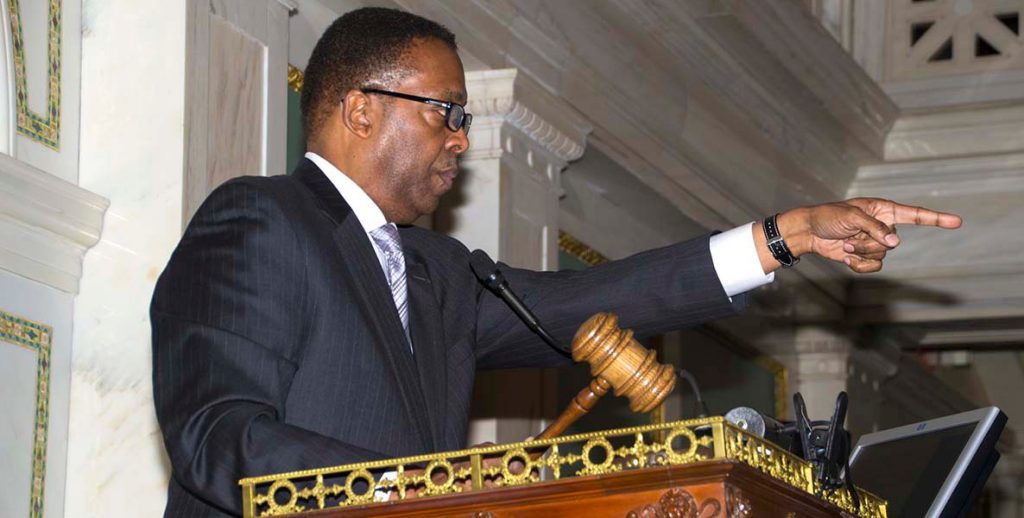Last week, just days after a jury came back with a swift verdict in favor of developer Ori Feibush in his First Amendment lawsuit against Councilman Kenyatta Johnson, Council President Darrell Clarke appeared on Sunday’s Inside Story, the public affairs show on Channel 6. (Full disclosure: I’m an occasional bloviating head on the show.)
Moderator Tamala Edwards zeroed in on the ramifications of the stunning jury verdict, which found that Johnson, using the powers of Councilmanic Prerogative, violated his political opponent Feibush’s rights by denying him two properties for which the developer had been the top bidder at auction.
Clarke, doing his best Captain Renault impression from the movie Casablanca, acted shocked, shocked to hear that such a thing—what did you call it, Councilmanic what?—has been going on right under his nose.
Refresher course: Councilmanic Prerogative refers to the near-absolute power each of the city’s 10 district Council members wield over development projects in their respective districts. This longstanding tradition—not codified in any law or the Home Charter—is a gentleman’s agreement whereby Council members defer to the Councilperson in whose district a project resides. The result is that each district Councilperson holds the power to green-light or stall all projects in his or her district, whether for good or ill.
By adhering to a shadowy off-the-books agreement, the political class shrewdly protected itself from legislative reform for decades. But they didn’t count on political change coming from jury verdicts
Our history is replete with the deleterious effects of this practice. Like when Councilman Brian O’Neill held up an $800 million expansion of Fox Chase Cancer Center in his Northeast district because he wanted Fox Chase to fund a “community benefit fund.” (When Fox Chase merged with Temple, the issue became moot). Or when Councilwoman Jannie Blackwell held up the move of the Barnes museum to Center City by blocking the relocation of the city’s Youth Detention Center to her West Philadelphia district—until she got a $12 million grant for a community center named after her late husband. In fact, this type of “scratch my back, I’ll get you that property deal” mentality—often thanks to Councilmanic Prerogative—has, through the years, led to at least three Council members (George Schwartz, Rick Mariano and Leland Beloff) being sent off to the Big House for shaking down developers.
Yet, asked about the jury verdict on Channel 6, there was Clarke, acting dumb.
“I don’t know what that is, Councilmanic Prerogative,” the president of City Council actually said. “I know what the Charter says. The disposition of land is a Charter-mandated responsibility.”
Okayyyy, then. This has long been the political insider’s playbook: Because the gentleman’s agreement isn’t codified in the Charter or otherwise on the books, simply feign ignorance. Ignore it and it will go away, despite the fact that a 2015 Pew study found that, of 730 land-use votes, Council has never voted against the wishes of the member in whose district the property in question resides.
A lot of us have railed about the practice—that it stalls common good development, that it diminishes zoning and planning, that it can lead to a culture of de facto extortion—but we’ve always shrugged and resigned ourselves to that old standby: This is how things are in Philly.

But then came Feibush and his gunslinger lawyer, Wally Zimolong, and a jury verdict that ought to strike fear into the hearts of Clarke and other purveyors of the status quo. It just may be that Feibush’s challenge is the first of many. By adhering to a shadowy off-the-books agreement, the political class shrewdly protected itself from legislative reform for decades. But they didn’t count on political change coming from jury verdicts.
“Let’s be frank,” Zimolong says when I caught up with him earlier this week. “The facts of this case were so clear. Councilmanic prerogative was used to retaliate against Ori and his exercise of his First Amendment rights, as a political opponent of the Councilman. But I can imagine other scenarios that would also justify a claim against the city of Philadelphia.”
For example, in this case, the jury found that Feibush’s free speech rights had been impeded. But what if another developer comes forward who doesn’t want to exercise his free speech rights—and, as a direct consequence, loses out on a public property deal?
“Citizens United held that contributing money to political campaigns is a form of protected free speech,” Zimolong says. “Well, you also have the right not to speak. If you choose not to give money to a Councilperson, or to donate to a Councilperson’s pet cause, and are then shut out of the public bidding process because you decided not to be part of the political game, haven’t your rights also been violated? I think they have been. I think a developer who says, ‘Hey, I’m just a developer—I don’t want to give to your political campaign’ and who then loses out on a land deal as a result has the basis for a First Amendment claim against the city of Philadelphia.”
Then there are the cases where a Councilperson holds up a public project in exchange for some other type of consideration—like Jannie Blackwell’s reported desire to have that community center named for her husband in her district. Zimolong says that a developer under that type of scenario could also have a case, in accordance with the Fifth Amendment’s Takings Clause.
“I don’t know what that is, Councilmanic Prerogative,” the president of City Council actually said. “I know what the Charter says. The disposition of land is a Charter-mandated responsibility.”
“A governmental body can’t condition land use on something that has nothing to do with the project itself,” Zimolong says. “Under the Takings Clause, the city might owe you compensation if you were denied a public land use based on your refusal to do something that has nothing to do with the property you seek to own. That would really warrant investigation.”
Obviously, these are untested legal theories, but that’s the point. Maybe the time is right to put Zimolong’s ideas to the test. He sure sounds game, which is odd. Most lawyers, you would assume, would think twice about taking on all-powerful district Council members.
But Zimolong, 38, is that rarest of Philadelphians: A Republican. And not just any Republican: A Ted Cruz-supporting, “that government is best which governs least” kind of Republican. In fact, he says he’s an American first; a conservative second; and a Republican third. Doesn’t sound like someone who needs to worry about offending City Hall.
“I don’t have any political affiliation with anyone in city government, and nor will I, unless there’s a sudden change and a two-party system emerges,” says the graduate of Villanova, undergrad and law. “Ori deserves all the credit for standing up. I was just uniquely positioned to take his case because I’m not beholden to the machine.”
In the days since the verdict, Zimolong reports that he’s been getting calls from lawyers, telling him they have developer clients who just might have cases—would he talk to them?
Bring ‘em on, Zimolong says. But it begs the question: The lawyers calling? Why wouldn’t they handle their client’s cases themselves? Might they not want to run afoul of the political establishment?
Zimolong laughs. “I haven’t asked,” he says. “I can only make that assumption.”
Header photo: Jared Piper/PHL Council Fellow

